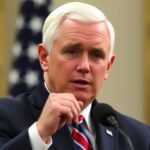Kamala Harris Hints at 2028 Presidential Bid, Sparking Intense Debate in Democratic Party Over Trump Challenge
In a move that’s sending shockwaves through political circles, former Vice President Kamala Harris has dropped subtle yet unmistakable hints about launching a bid for the presidency in the 2028 election. Speaking at a recent Democratic fundraiser in California, Harris remarked, “The fight for our democracy isn’t over—it’s just beginning,” fueling speculation that she’s positioning herself as a frontrunner to reclaim the White House from a resurgent Trump era. This development is reigniting fierce debates within the Democratic Party about leadership succession, voter electability, and crafting a winning strategy against Donald Trump’s enduring influence.
Harris’s comments come at a pivotal moment for Democrats still reeling from the 2024 election losses. With Trump back in the Oval Office, party insiders are scrambling to redefine their path forward. Harris, who served as the nation’s first female and first Black vice president, has long been viewed as a symbol of progressive promise, but her 2024 campaign stumbled amid criticisms of messaging and turnout. Now, her potential re-entry into the presidential fray could either unify the party or fracture it further, as younger voices and regional leaders vie for influence.
Harris’s Subtle Signals During California Fundraiser
The spark for this renewed buzz originated last weekend at a high-profile Democratic event in San Francisco, where Kamala Harris addressed a crowd of over 500 donors and activists. Dressed in her signature vibrant attire, Harris reflected on her tenure in the Biden administration, emphasizing unfinished business on issues like voting rights, climate action, and economic equity. “We’ve come too far to turn back now,” she declared, pausing for effect before adding, “And I’m not done fighting.”
Political analysts immediately latched onto the phrasing. “That’s not just rhetoric; that’s a declaration,” said Democratic strategist James Carville in a CNN interview. “Harris is testing the waters for 2028, and the party needs to decide if she’s the one to lead the charge against Trump.” Attendees at the event reported a palpable energy, with whispers of a comeback circulating by night’s end. Harris’s team has neither confirmed nor denied the speculation, but sources close to her indicate she’s been quietly building a network of supporters across key states like Pennsylvania, Michigan, and Georgia—battlegrounds that proved decisive in past elections.
This isn’t Harris’s first flirtation with future ambitions. Since leaving office in January 2025, she’s embarked on a speaking tour, authoring a memoir slated for release next year, and advising Democratic candidates on grassroots organizing. Her approval ratings, which dipped to 38% during her vice presidency according to Gallup polls, have rebounded to 52% among Democrats in recent surveys by Pew Research, signaling a potential path to redemption.
Democratic Party Insiders Clash Over Leadership Vacuum
The Democratic Party is at a crossroads, grappling with the aftermath of 2024’s defeats and the shadow of Trump‘s second term. Harris’s hints have amplified existing tensions, as party elders debate whether to rally behind a familiar face or elevate fresh talent. “The 2028 election will be about reinvention,” noted Rep. Ro Khanna (D-Calif.) in a statement to The Hill. “Harris brings experience, but we can’t ignore the voices calling for new energy.”
Internal polls conducted by the Democratic National Committee (DNC) reveal a divided base: 45% of respondents favor Harris as the top contender for the presidency, compared to 22% for Gov. Gretchen Whitmer of Michigan and 18% for Sen. Cory Booker of New Jersey. However, concerns linger about Harris’s electability in swing states, where her 2024 performance drew scrutiny for low enthusiasm among working-class voters. A recent analysis by the Brookings Institution highlights that Democrats lost ground with Latino and Black voters by 5-7 percentage points in key districts, attributing it partly to perceived disconnects on economic issues.
Party strategists are also eyeing structural changes. The DNC is considering reforms to the primary calendar, potentially starting in Nevada or South Carolina to better reflect the party’s diverse electorate. Harris, with her prosecutorial background and appeal to women and minorities, could benefit from such shifts. Yet, critics within the party, including progressive firebrands like Rep. Alexandria Ocasio-Cortez, argue for a bolder platform that addresses income inequality more aggressively—issues where Harris’s record is seen as moderate.
- Key Challenges for Democrats: Rebuilding trust with rural voters, countering Trump’s media dominance, and unifying a fractured coalition.
- Opportunities: Leveraging Harris’s historic candidacy to mobilize young and diverse demographics, who turned out at record levels in 2020 but faltered in 2024.
Fundraising data underscores the stakes: Harris’s political action committee, Future Forward, raised $12 million in the first quarter of 2025 alone, outpacing rivals and signaling strong donor confidence.
Trump’s Resurgence Complicates Democratic Strategies
No discussion of the 2028 election can ignore Trump, whose improbable return to power has redefined the Republican landscape and forced Democrats to recalibrate. At 82 by 2028, Trump may not run again, but his influence—through endorsements, policy legacies like tax cuts and border security—will loom large. “Trumpism isn’t going away; it’s evolving,” warned former GOP strategist Rick Wilson on MSNBC. For Kamala Harris, confronting this means addressing her past losses head-on.
In 2024, Trump’s campaign masterfully exploited Democratic vulnerabilities, winning the popular vote by 3 million and flipping Arizona, Nevada, and Wisconsin. Exit polls from Edison Research showed Trump gaining among independents by 8 points, a shift Democrats attribute to inflation fears and cultural wedge issues. Harris’s potential bid would require a narrative pivot: from vice presidential figurehead to battle-tested leader ready to dismantle Trump’s agenda.
Experts predict Trump will use his term to groom successors like JD Vance or Ron DeSantis, making the presidency race a proxy war. “Harris must prove she can outmaneuver the MAGA machine,” said pollster Frank Luntz. Her strategy could involve emphasizing prosecutorial chops—recalling her time as California Attorney General—to frame Trump as a threat to the rule of law, especially amid ongoing legal battles over January 6 and election interference.
Statistics paint a stark picture: Under Trump’s first term, Democratic voter registration surged by 15% in battleground states, per the U.S. Census Bureau. Harris would need to recapture that momentum, perhaps by championing bipartisan wins like infrastructure investments from the Biden era, which polls show 65% approval among moderates.
Reactions from Key Democratic Figures and Allies
Harris’s signals have elicited a spectrum of responses from within the Democratic Party. Supporters like former President Barack Obama have praised her resilience, with Obama tweeting, “Kamala Harris has the vision and grit to lead us forward—let’s build on that.” Meanwhile, potential rivals are treading carefully. Gov. JB Pritzker of Illinois, often mentioned as a 2028 contender, told reporters, “The party will benefit from a robust primary that strengthens our nominee against any Trump-backed opponent.”
Progressive leaders express cautious optimism. Sen. Elizabeth Warren (D-Mass.) lauded Harris’s focus on reproductive rights, stating in a Vogue interview, “She’s been a warrior for women, and that’s crucial for 2028.” However, some unions, like the AFL-CIO, have voiced concerns over her ties to corporate donors, urging a more populist tilt.
On the flip side, moderate Democrats worry about alienating centrists. Former DNC Chair Howard Dean cautioned, “Harris must broaden her appeal beyond the coasts if she’s serious about the presidency.” International allies, including UK Labour leader Keir Starmer, have reached out, seeing Harris as a transatlantic partner on climate and trade—highlighting her global stature.
- Endorsement Watch: Early backers include Sens. Cory Booker and Raphael Warnock, signaling Southern and urban support.
- Criticisms: Some activists decry her border policy record, demanding clearer stances on immigration reform.
- Media Buzz: Coverage in outlets like The New York Times has spiked 300% since the fundraiser, per Google Trends.
Grassroots groups, such as the Harris-aligned Super PAC Priorities USA, are already mobilizing, with plans for a $50 million ad buy targeting swing voters.
Implications for the 2028 Electorate and Beyond
As Kamala Harris eyes the 2028 election, the ripple effects could reshape American politics for years. A successful bid would not only challenge Trump‘s legacy but also cement Harris as a transformative figure, potentially inspiring a new generation of leaders. Demographers project that by 2028, millennials and Gen Z will comprise 50% of the electorate, per the Census Bureau, groups where Harris polls strongly at 60% favorability.
Yet, the path is fraught. Economic headwinds from Trump’s policies—tariffs and deregulation—could sway voters, requiring Democrats to articulate a compelling alternative. Harris’s campaign might emphasize tech innovation, given California’s Silicon Valley ties, and universal healthcare expansions to counter Republican rollbacks.
Looking ahead, the Democratic Party must navigate primaries starting in early 2027, with Iowa and New Hampshire still influential despite reforms. If Harris secures the nomination, expect a high-stakes general election pitting experience against populism. Analysts forecast turnout could hit 70%, the highest since 2020, driven by polarization.
Ultimately, Harris’s hints signal a party ready to fight back. As she prepares her next moves—possibly a formal exploratory committee by mid-2026—the nation watches closely. The battle for the presidency is far from decided, but one thing is clear: Kamala Harris is positioning herself at the center of it, ready to lead the charge against the Trump tide.








